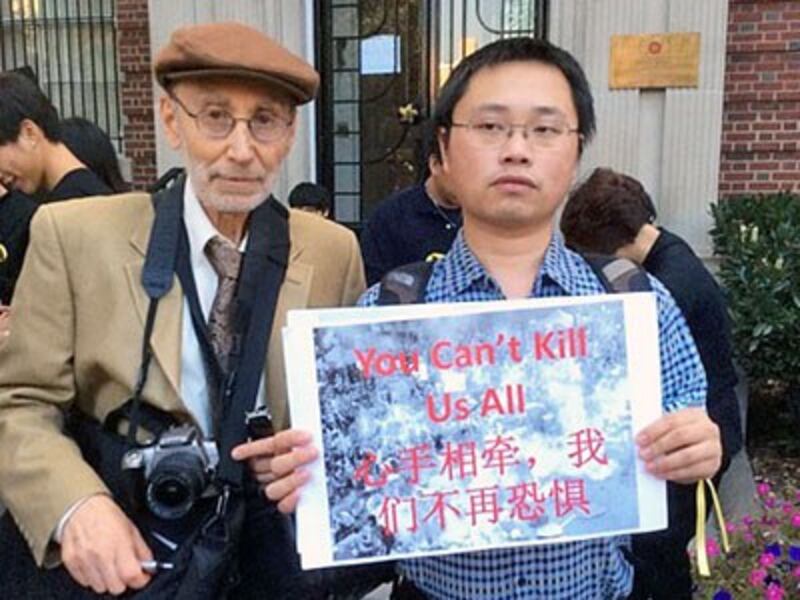A human rights and pro-democracy campaigner who took selfies wearing a T-shirt merging the name of President Xi Jinping with Hitler's is being held in a police-run detention center in the northeastern province of Jilin, RFA has learned.
Ethnic Korean Quan Ping, whose name is also spelled in its Korean form, Kwon Pyong, has been incommunicado since his disappearance on Sept. 30.
An employee who answered the phone at the Yanji Detention Center in Jilin's Yanji city confirmed he was an inmate there on Thursday.
"Yes, Kwon Pyong is here at our detention center, the Yanji Detention Center," the employee said, but declined to give further details.
"You should get in touch with his parents and other relatives," the employee said.
Kwon Pyong's detention came after he posted a selfie outside a government building while wearing a T-shirt with banned keywords linked to President Xi, including the word "Xitler."
He had also told a friend he planned to walk around wearing it on Oct.1, the anniversary of the founding of the People's Republic of China.
Since his disappearance, former classmates at the University of Queensland in Australia, and overseas Chinese students' associations have repeatedly called on the government to release him immediately.
A statement issued on Thursday by his U.S.-based friend Gu Yi, currently studying at the University of Georgia, and his Queensland classmates Zhang Shuren and Yi Songnan said they were speaking out on Kwon's behalf because their own freedoms are also at stake.
"The human rights situation in China continues to get worse and worse, with increased oppression of dissidents under the administration of President Xi Jinping," Zhang told RFA in an interview on Thursday.
"Xi is trying to extend his power overseas now, by kidnapping dissidents and bringing them back to China," he said. "But he is trying to turn back the progress of history."
"We call on Xi Jinping to release Kwon Pyong immediately, and to end all political persecution," he said.

Young people must ‘wake up’
Yi Songnan, who co-signed the statement along with 38 other overseas Chinese students, said it is important for young people to "wake up" and stand up to an authoritarian government.
"I would like to say to Xi Jinping that public opinion among overseas Chinese students is a growing force, because more and more of us are starting to be concerned about human rights in China," Yi said.
Yi said the trio's statement had garnered unprecedented support among Chinese students overseas.
"We have seen this from the number of people who spontaneously signed this statement," Yi said.
Gu Yi, meanwhile, said China is already stepping up political pressure on its hundreds of thousands of students studying in universities outside the country, which means that signing such statements openly carries its own risks.
"Anything we say while we're out of the country or any political activities we get involved in could be used as evidence for criminal charges against us [when we return]," Gu said.
"We're not safe, even if we are living in a free, democratic country," he said.
He said Kwon's case had brought it home to Chinese students that human rights abuses don't just happen to other people.
"It's not just something you read about in the newspapers; it's happening in front of our noses," Gu said. "So we have to stand up and do something to support our classmate."
Brave Johnny
A vociferous next-generation rights activist and graduate of Iowa State University, Kwon, now 28, also traveled to take part in the 2014 Occupy movement for fully democratic elections in Hong Kong.
He was also active on Twitter, which is blocked in China, and used social media to publicly criticize the "tyranny" of the Communist Party and express solidarity with causes like Free Tibet and the commemoration of those who died in the crackdown on the 1989 democracy movement on Tiananmen Square.
Fellow activists have described Kwon, who went by the Twitter handle @BraveJohnny, as showing a level dedication to his activism that is unusual among young people in today's China.
Kwon had also used his social media accounts to commemorate the June 4, 1989, massacre, and had repeatedly expressed his support for arrested lawyers in the form of postcards sent to them in jail or detention.
Reported by Ng Yik-tung and Lee Lai for RFA's Cantonese Service. Translated and written in English by Luisetta Mudie.
